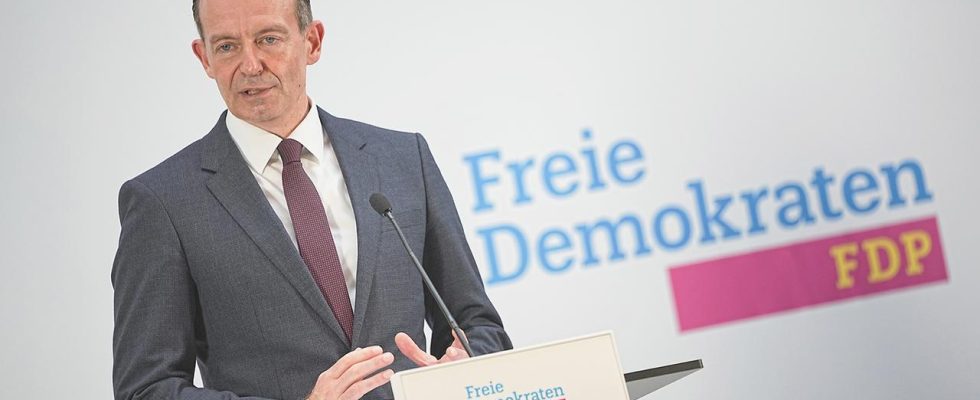First the supply chain law, now the CO2 regulations for trucks: Once again, an EU-wide project is in danger of being thwarted by a veto from the FDP. This is causing criticism – this time also from business.
After the supply chain law that has already been negotiated at EU level is likely to fail due to resistance from the FDP, another EU project is now threatened with being blocked by the smallest of the three German government parties: According to consistent information from the Frankfurter Allgemeine Zeitung and the news agencies dpa and Reuters, the FDP surprisingly vetoed the planned limit on CO2 emissions from trucks and buses, which is a central component of the EU’s “Fit-for-55” climate protection package.
Government spokesman Steffen Hebestreit confirmed that the German position on the plans was still being negotiated. Instead of this Wednesday, as originally planned, the topic is now on the agenda of the responsible EU committee for Friday. Neither the lead environment ministry nor the transport ministry commented on the reasons for postponing the package, which had actually been negotiated long ago.
However, Reuters quotes government circles as saying that Transport Minister Volker Wissing had surprisingly announced resistance. The FDP politician therefore wants to ensure that climate-neutral so-called e-fuels can be taken into account. The dpa agency writes that the Federal Ministry of Transport is concerned with technological openness.
In the meantime, an FDPEuropean party conference
Negotiators from the EU states had actually already agreed on January 18th that the new specifications for so-called fleet limit values should come. These limits regulate how much climate-damaging CO2 vehicles will be allowed to emit in the future. The CO2 emissions from coaches and trucks are expected to fall by 90 percent by 2040 – compared to 2019. In the meantime, the FDP had a European party conference at which the participants spoke out strictly against fleet limits. Specifically, it said: “We will abolish the fleet limits without replacement.”
If the three traffic light parties cannot agree on a common position, Germany will have to abstain from the vote at EU level, which is effectively equivalent to a no. It is uncertain whether the votes required for the project will be obtained without Germany, as other EU states also have concerns about the project in its current form.
criticism of the reliability Germany
On the one hand, Wissing’s approach is reminiscent of a year ago, when he blocked the phase-out of combustion engines from 2035. There was then some vehement criticism of the federal government and its reliability in European negotiations was questioned. Former Latvian Prime Minister Krisjanis Karins spoke at an EU summit of a “very, very difficult sign for the future”. The entire decision-making architecture would fall apart if everyone did that.
Most recently, FDP ministers in the federal government blocked an agreement on the EU supply chain law. Here, too, the EU institutions had long ago agreed on a compromise. Accordingly, large companies should be able to be held accountable in European courts if child labor or forced labor occurs in their production and supply chains.
Finance Minister Christian Lindner and Justice Minister Marco Buschmann (both FDP) announced last week that they could not support the directive. This means that Germany will also have to abstain from this in the final vote of the EU countries planned for Friday; the entire law is in jeopardy.
Baerbock: “We are wasting trust”
The FDP is not only causing dissatisfaction at the EU level, but also within the traffic light coalition. Foreign Minister Annalena Baerbock said: “If we break the word we gave in Brussels, we will lose trust.”
The fact that Germany, despite earlier approval of the supply chain law, is now “abstaining at the last few meters is damaging our reliability as a partner and our weight in Europe,” said the Green politician. Federal Labor Minister Hubertus Heil from the SPD had previously sharply criticized the FDP and spoke of an “ideologically motivated blockade”.
Auto industry demands Planning security
And unlike the veto against the supply chain law, the FDP apparently does not receive any support from business when it comes to CO2 limitation. The Association of the German Automotive Industry (VDA) praised the regulation on limit values that had already been agreed in the EU and called for a quick agreement.
According to the VDA, reliability is of great importance for companies in the German automotive industry. “All political actors” should therefore ensure that the regulation “can be finalized during this legislative period and that companies quickly receive planning security.”
The Reuters agency, which specializes in economic issues, reports that industry circles say that the industry is angry about Wissing. The truck manufacturers from Germany wanted planning security and had already intervened with the Chancellery.

